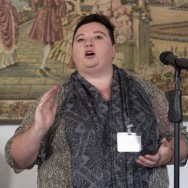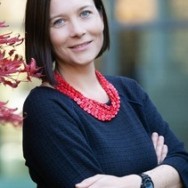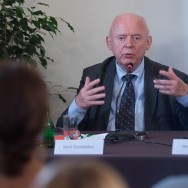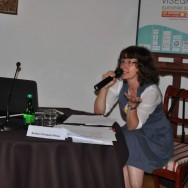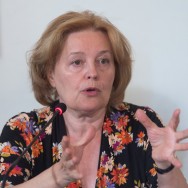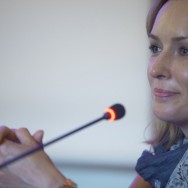Deputy Mayor of Krakow in charge of Culture and City Promotion. Master of Arts in Theatre Studies, manager of culture, producer of festivals, shows and TV programs. Director of the Krakow Festival Office (2008-2010). Co-initiator of legislative reforms regulating the cultural sector.
Experts
Natasza Styczyńska
Dr Natasza Styczyńska is an Assistant Professor at the Institute of European Studies of the Jagiellonian University in Kraków (Poland). Her academic interests include party politics, populism, Euroscepticism and European Integration in Central and Eastern Europe and the Balkans. She leads JU team in H2020 REGROUP Rebuilding Governance and Resilience out of the Pandemic research project and is a director of studies of Una Europa Joint BA in European Studies at Jagiellonian. Previously she has been engaged in research within two H2020 projects: ‘POPREBEL - Populist rebellion against modernity in 21st-century Eastern Europe: neo-traditionalism and neo-feudalism’ (2019-2022) and ‘EU3D - EU Differentiation, Dominance and Democracy’ (2019-2023). She has been a visiting researcher at University College London, the University of Vienna, and the University of Belgrade, as well as a visiting lecturer at universities across Europe, Asia, North Africa,
and South America.
Karol Szyndzielorz
Graduated from the Warsaw University (Dep. Of Journalism, MA Specialization in International Relations). He began his career in 1957 at the Życie Warszawy daily as a reporter. During the Warsaw Block intervention to Czechoslovakia in 1968 he worked as a foreign correspondent, and later as an editor of the Science and Technology section. He did post graduate work in Socials Sciences and Political Sciences as a Ford Foundation grantee at Cornell University and Stanford University. During 1977 and 1978 he was the first Polish Nieman Fellow at Harvard University. Since 1979 he has been the co-editor of the Global Paper One World published by the UN system. This publication and Życie Warszawy were both suspended under the material law in 1981. He then moved to the Polish Newsweek as foreign editor (1985-1991). In 1989, he was spokesman of the Round Table debates in Warsaw. Founder and editor-in-chief of the financial daily Nowa Europa (1991). In 1994, he became deputy CEO and member of the board of Zasada Group (Mercedes Polska). Founded and owned the company Media Group in 1996. Currently he is the advisor of the Executive Board of Siemens Polska.
Barbara Törnquist-Plewa
PhD, since 1997 professor in East and Central European Studies and since 2004 Director for the Centre for European Studies, Lund University, Sweden. She specialises in cultural studies and contemporary history focusing on studies of identities, symbols, collective memory and nationalism. She has published 12 edited or single authored books and many articles and book chapters on these topics. She is the editor in chief of Slavica Lundensia and on the advisory board of the journals Baltic Worlds and Bialoruskie Zeszyty Historyczne. Since 2012 she leads an international research network in Memory Studies, financed by EU/COST. Her recent book on Central and Eastern Europe culture is the edited volume: ”Cultural Transformations after Communism: Central and Eastern Europe in Focus” 2011.
Magdaléna Vašáryová
A member of the National Council of the Slovak Republic. Chairwoman of the oldest Slovak women’s association „Živena“ and chairwoman of the Institute for cultural policies. In the past she served as a State Secretary in the Ministry of Foreign Affairs of the Slovak Republic. Ambassador of the Slovak Republic to Poland (2000 – 2005), between 1990 – 1993 Czechoslovak Ambassador to Austria. Founder and in years 1993 – 2000 the director of the Slovak Foreign Policy Association - SFPA (today honorary chair). Lectured at the Institute of International Relationships and Law Harmonization at the Faculty of Law of the Comenius University in Bratislava, and currently she is lecturer at the CEVRO Institute (Prague). In 2010 she was awarded with a Gold Medal for Meritorious for Culture – Gloria Artis. An author of several books and articles in domestic and international press.
Michal Vašečka
Doc. PhDr. Michal Vašečka, PhD (1972) is sociologist by background and focuses his interests on issues of ethnicity, race, antisemitism, and migration studies. As an Associate Professor he operates at the Bratislava International School of Liberal Arts (BISLA) since 2015 and he is a director of Bratislava Policy Institute. He operated at the Faculty of Social Studies of Masaryk University in Brno in 2002-2017 and at the Faculty of Social and Economic Sciences of the Comenius University in 2006-2009. As a visiting scholar he operated at the New School University in New York (1996-1997) and at the University of London (1998), in 2008-2009 he lectured at the Georgetown University in Washington, DC, in 2015 at the University of Michigan in Ann Arbor, in 2016 he was a scholar-in-residence in the ISGAP at Oxford University. Michal Vašečka is a founder of the Center for the Research of Ethnicity and Culture, he served a director of the CVEK (2006-2012). In 1998-2005 he operated at the Slovak think-tank Institute of Public Affairs as a program director on expert analysis of the Slovak transformation process with a focus on national minorities and the state of civil society in Slovakia. He has been a consultant for the World Bank in 2000-2008 and in 2011-2012. Since 2012 Michal Vašečka serves as a representative of the Slovak Republic in the European Commission against Racism and Intolerance (ECRI), human rights body of the Council of Europe. He is also as a vice-chairman of the governmental committee VRAX tackling extremism and racism in Slovakia. Michal Vašečka serves as a non-resident research associate at the European Centre for Minority Issues in Flensburg. In 2018 Michal became a laureate of the Award for special contribution in the field human rights of Minister of Justice of Slovakia.
Karla Wursterová
Graduated in Business Management at the University of Economics in Bratislava and the Ecole Nationale d’Administration Publique in Paris. Her professional career begun in 1998, working at the Office of the Deputy Prime Minister of the Slovak Republic. After working two years for Ministry of Foreign Affairs of the Slovak Republic, she served four years (2005-2009) in Prague, as second secretary in Embassy of the Slovak Republic. Between 2010 and 2012 she worked as the Director of the Development Assistance and Humanitarian Aid Department in the Ministry of Foreign Affairs in Bratislava. Since August 2012, she holds the position Executive Director of International Visegrad Fund, in Bratislava. Speaks five languages: English, French, Czech, Hungarian and Russian.
Pages
- « first
- ‹ previous
- 1
- 2
- 3
- 4

